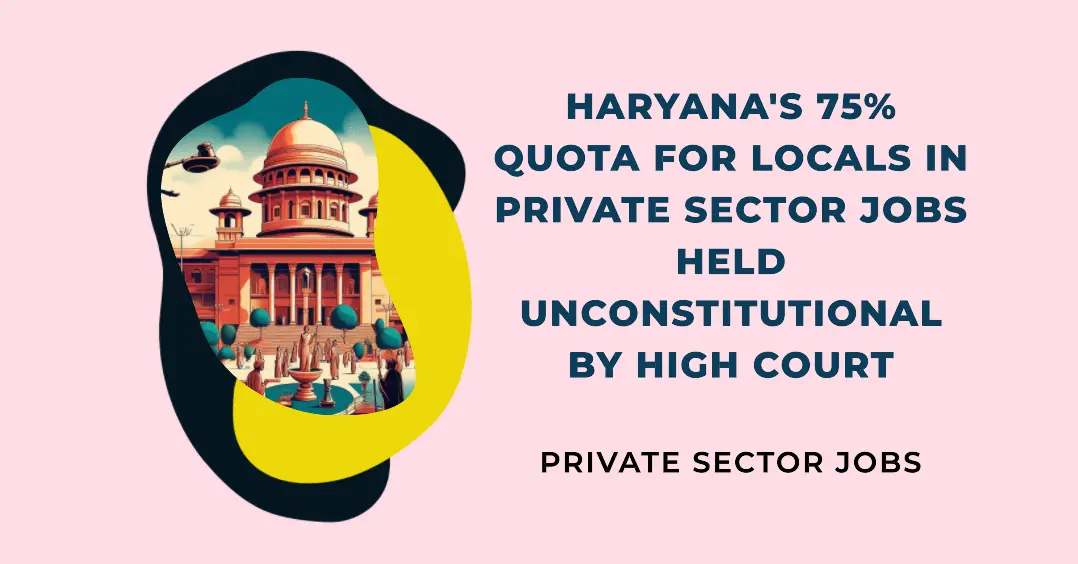The Punjab and Haryana High Court on Friday quashed a law that granted 75% reservation in private sector jobs to Haryana residents. The court held that the law was unconstitutional, arbitrary and violative of the fundamental rights of citizens.
What was the law and why was it challenged?
The Haryana State Employment of Local Candidates Act, 2020 was enacted by the Haryana government in March this year with an aim to provide more employment opportunities to local candidates in private sector industries. The law mandated that every employer with more than 10 employees in the state should reserve at least 75% of the jobs with a salary of up to Rs 50,000 per month for candidates who are domiciled in Haryana.
The law also empowered the government to impose a penalty of up to Rs 5 lakh on employers who failed to comply with the reservation policy. The law also provided for a grievance redressal mechanism for both employers and employees.
The law was challenged by various petitioners, including industry associations, private companies and individuals, who argued that the law was discriminatory, unreasonable and against the constitutional principles of equality, freedom of trade and commerce, and right to livelihood. They contended that the law would adversely affect the industrial growth, investment climate and skilled workforce in the state.
What did the court say?
The High Court bench comprising Chief Justice Ravi Shanker Jha and Justice Arun Palli struck down the law as unconstitutional and invalid. The court observed that the law was based on a “misplaced assumption” that outsiders were depriving locals of employment opportunities in the state.
The court said that the law violated Article 14 (equality before law), Article 15 (prohibition of discrimination), Article 16 (equality of opportunity in public employment), Article 19 (1) (g) (freedom to practice any profession or occupation) and Article 21 (right to life and personal liberty) of the Constitution.
The court also noted that the law encroached upon the domain of the central government, which has the exclusive power to regulate inter-state migration and labour under Entry 25 of List III (Concurrent List) of the Seventh Schedule of the Constitution.
The court further held that the law was arbitrary and irrational as it did not have any reasonable nexus with the objective of providing employment to local candidates. The court said that the law failed to take into account the ground realities of the industrial sector, such as the availability of skilled manpower, market demand and supply, and regional diversity.
The court also rejected the government’s argument that the law was a temporary measure to deal with the economic crisis caused by the Covid-19 pandemic. The court said that there was no empirical data or material to show that the pandemic had resulted in unemployment or displacement of local candidates in the state.
What are the implications of the verdict?
The verdict has been welcomed by the industry bodies and private employers, who have expressed relief and satisfaction over the court’s decision. They have said that the verdict will restore confidence and trust among investors and entrepreneurs, who were apprehensive about setting up or expanding their businesses in Haryana due to the reservation policy.
The verdict has also been hailed by various experts and activists, who have said that the verdict will uphold the constitutional values of equality, diversity and inclusiveness, and will protect the rights and interests of workers from different states and regions.
However, the verdict has also drawn criticism from some quarters, especially from some political parties and groups, who have supported the reservation policy as a pro-people and pro-poor measure. They have said that the verdict will deprive lakhs of local youth of job opportunities in their own state, and will favour outsiders over locals.
The Haryana government has also expressed its disappointment over the verdict, and has announced its intention to challenge it in the Supreme Court. Deputy Chief Minister Dushyant Chautala, who is also in charge of the labour department, has said that the government is examining the verdict and will soon file an appeal in the apex court.
How does Haryana compare with other states on reservation in private sector?
Haryana is not the only state that has enacted a law to provide reservation in private sector jobs for local candidates. Several other states, such as Andhra Pradesh, Karnataka, Madhya Pradesh, Gujarat and Maharashtra, have also passed similar laws or policies in recent years.
However, most of these laws or policies have either been stayed or challenged in courts on various grounds. For instance, Andhra Pradesh’s law that reserved 75% jobs for locals in industries was stayed by the High Court in July 2019. Karnataka’s policy that reserved 100% jobs for



